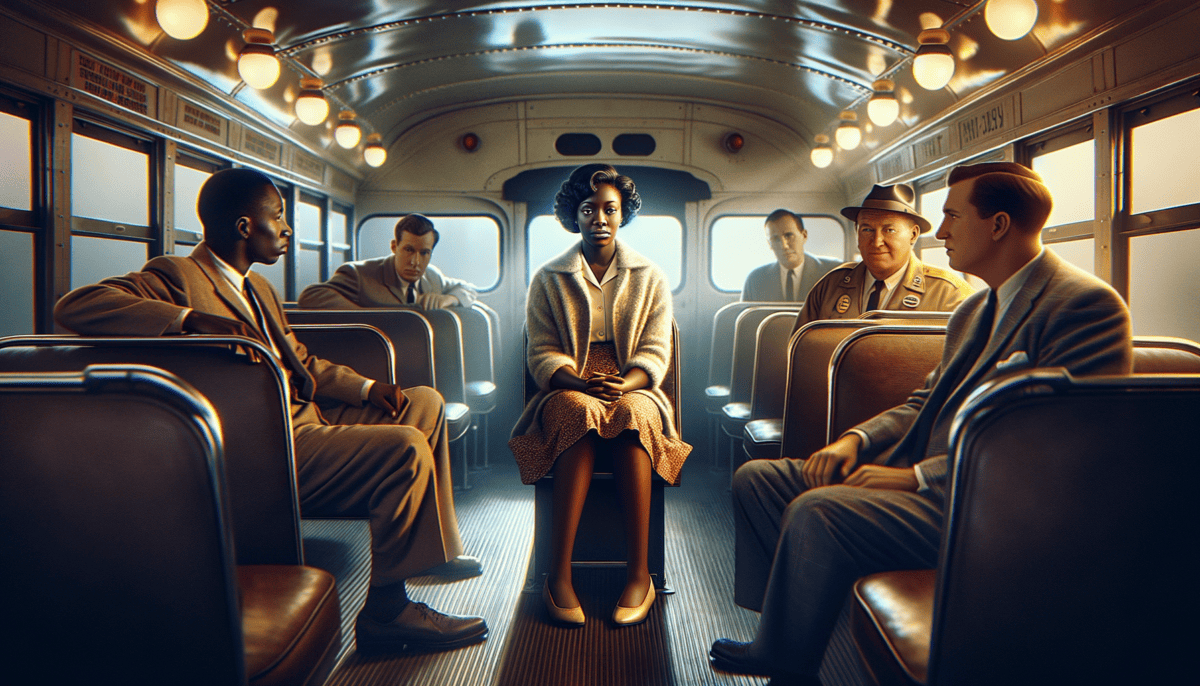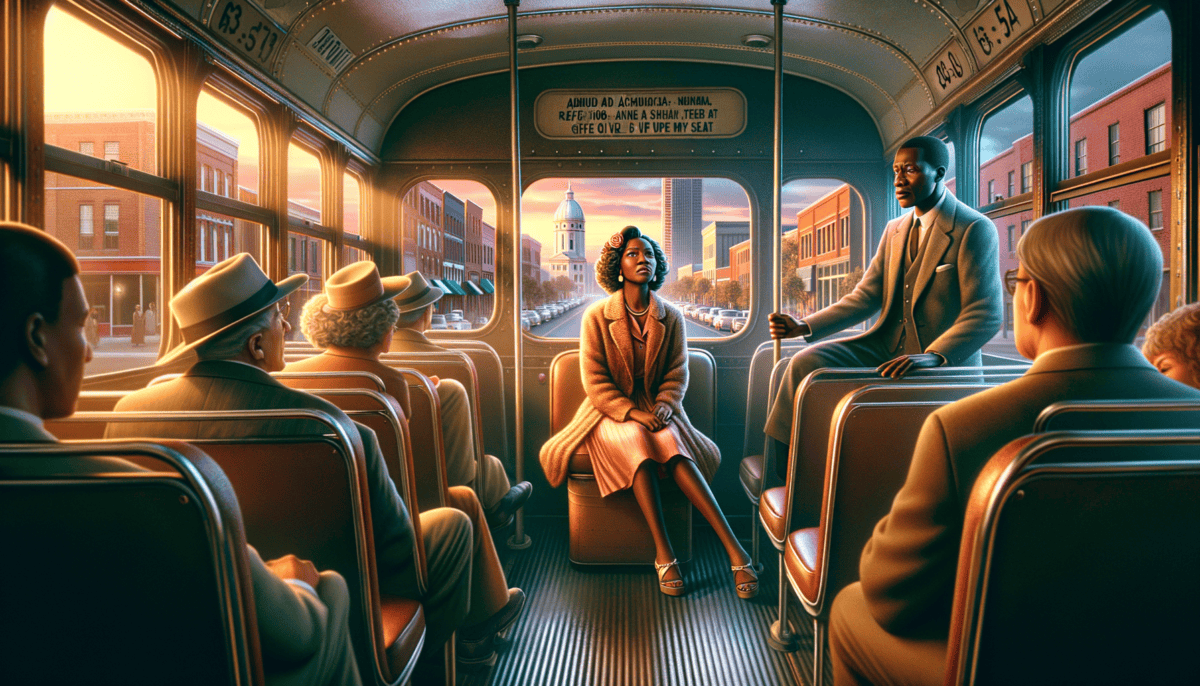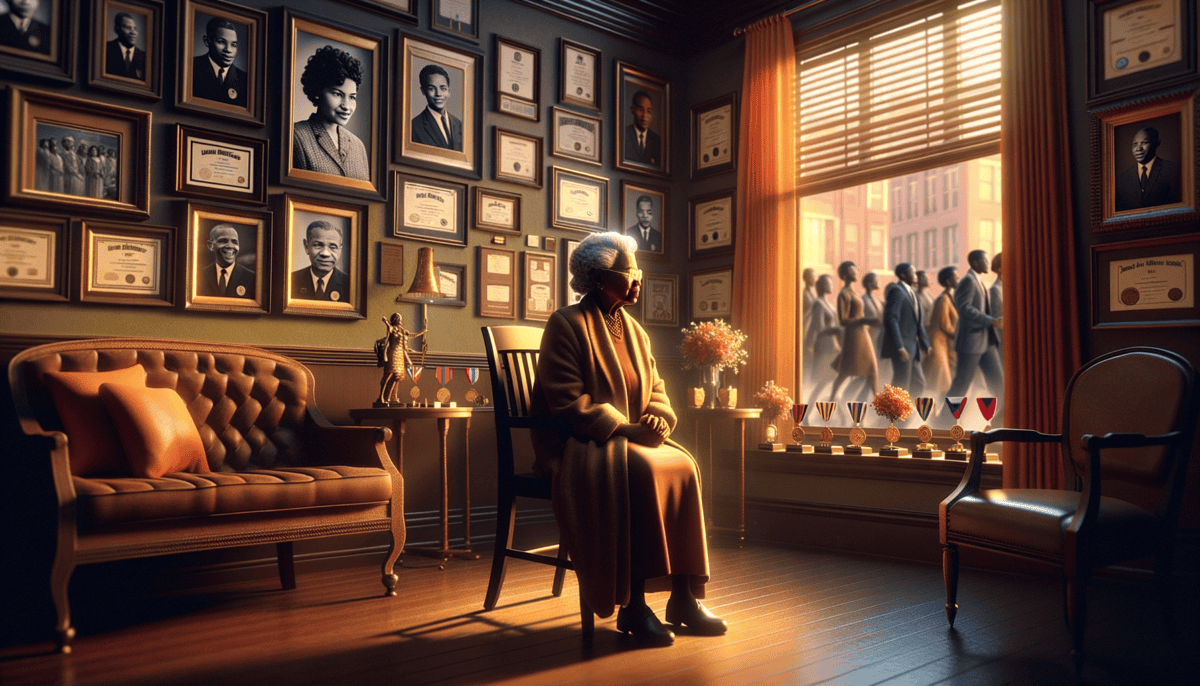Roots of Courage
On a warm spring morning in 1913, a tiny baby named Rosa Louise McCauley was born in Tuskegee, Alabama. Her parents smiled as they held their precious daughter, not knowing she would one day change the world.
"She's got bright eyes," Rosa's mama would say. "And a strong spirit too!"
Little Rosa lived in a small wooden house with her mama, daddy, and younger brother Sylvester. The family didn't have much money, but they had lots of love.
Growing up in Alabama wasn't easy for Rosa. There were unfair rules called "Jim Crow laws" that made life hard for Black people. Rosa saw these mean rules everywhere:
• Black children couldn't go to the same schools as white children
• Black people had to use different water fountains
• Black people had to sit in different places than white people
• Black people couldn't eat at the same restaurants
Young Rosa often asked, "Mama, why are things this way?"
Her mama would hug her tight and say, "Baby, we're going to make things better. But first, you need to be brave and strong."
“When I was a little girl, my grandmother told me stories about being brave,” Rosa would later remember. “Those stories stayed in my heart.”
Rosa loved to learn! Even though she had to walk to a far-away school for Black children while white kids rode buses to their nearby school, she never missed a day. She carried her books proudly, dreaming of a better future.
One day, a white boy pushed Rosa as she walked home.
"I'm going to push you back!" Rosa said bravely.
The boy's mother was angry at Rosa for standing up to her son. But Rosa's grandmother smiled and said, "That's my Rosa. Standing tall even when it's hard."
Every Sunday, Rosa went to church with her family. There, she learned about doing what was right, even when it was scary. She learned songs about freedom and hope that made her heart feel strong.
"God made all people equal," the pastor would say. These words stayed with Rosa, giving her courage.
As Rosa grew older, she helped her mama take care of sick neighbors. She learned that helping others made the whole community stronger. Her family might not have been rich with money, but they were rich with love and determination.
At night, Rosa would look up at the stars through her window and make a wish:
"One day, things will be different. One day, things will be fair."
Little did young Rosa know that she would be the one to help make that wish come true. Her childhood experiences were shaping her into someone who would stand up for what was right, someone who would help change America forever.
Her mama always said, "Rosa, you can change the world if you're brave enough to try." Those words planted a seed in Rosa's heart – a seed that would grow into something amazing.
Rosa's early years taught her important lessons about being brave, standing up for what's right, and never giving up. These lessons would help her face an important choice on a bus many years later…
Growing Awareness
As Rosa grew into a young woman, her determination to fight unfairness grew stronger. Each morning, she braided her long hair neatly and walked to the Industrial School for Girls, where she studied hard.
“Education is your ticket to a better life,” her mother would say, helping Rosa with her homework by lamplight.
In 1932, Rosa married Raymond Parks, a brave barber who fought for equal rights. Raymond encouraged Rosa to finish high school, and she did!
“My husband was the first real activist I ever met,” Rosa would later say. “He was so proud when I joined the NAACP.”
The NAACP (National Association for the Advancement of Colored People) was a group that helped Black people fight for their rights. Rosa became their secretary. She wrote down important notes about:
• People who needed help
• Unfair laws to change
• Plans for making things better
• Meetings to make friends stronger together
During the day, Rosa worked as a seamstress at a big department store. She sewed beautiful clothes for white customers, but she couldn’t try on clothes in the store or use the same dressing rooms.
“It’s not right,” Rosa would think as she carefully stitched each seam. “Everyone should be treated the same.”
Every day on her way to work, Rosa took the bus. The rules were very unfair:
Black people had to:
• Pay at the front door
• Get off the bus
• Walk to the back door
• Get back on
• Sit in the back seats only
Sometimes the bus would drive away after they paid, leaving them standing there!
“Mrs. Parks,” her young neighbor would ask, “why do we have to follow these mean rules?”
Rosa would squeeze the child’s hand and say, “We’re going to change them, sweetheart. We just need to be brave and work together.”
At NAACP meetings, Rosa met other brave people who wanted change. They shared stories, made plans, and gave each other courage. Rosa took notes at every meeting, writing down their hopes and dreams for a better future.
One hot summer day, a bus driver yelled at Rosa for entering through the front door. She got off and waited for another bus in the burning sun. That day, she promised herself something important.
“Someday,” she whispered, “things will be different.”
Rosa kept working hard, sewing during the day and helping the NAACP in her free time. She and Raymond talked about making changes, about standing up to unfair rules, about making the world better for everyone.
Every night before bed, Rosa thought about all the people who needed help. She knew that change was coming. She could feel it in her heart, like a tiny seed growing stronger every day.
The streets of Montgomery were getting ready for something big. Nobody knew it yet, but Rosa Parks was about to make a choice that would change everything…
A Stand for Justice
The cold winter air nipped at Rosa’s cheeks as she walked to the bus stop on December 1, 1955. After a long day of sewing at Montgomery Fair department store, her fingers were tired but her spirit was strong.
Rosa climbed onto bus #2857, paid her fare, and found a seat in the middle section. She smoothed her dress and opened her purse to find her glasses. The bus rumbled along, picking up more passengers.
At the Empire Theater stop, several white passengers got on. The bus driver, James Blake, looked back and shouted, “Y’all better make it light on yourselves and let me have those seats!”
Three Black passengers moved. Rosa stayed still, her heart beating fast but steady. She thought about all the times she’d moved before, all the unfair rules she’d followed.
“Are you going to stand up?” the driver demanded.
Rosa looked him in the eye and said quietly but firmly, “No, I’m not.”
“Well, I’m going to have you arrested,” he threatened.
“You may do that,” Rosa replied calmly.
The bus stood still. Minutes felt like hours. Some passengers grumbled, others watched in silence. Two police officers arrived, their badges gleaming in the early evening light.
“Why are you resisting?” one officer asked.
Rosa spoke softly but with determination: “I don’t think I should have to stand up.”
The officers took Rosa off the bus. As they led her to the police car, she held her head high. She wasn’t afraid anymore – she was ready to stand up by staying seated.
At the police station, they took her fingerprints. Rosa made one phone call to her husband Raymond:
“I’ve been arrested,” she said.
“I’ll be right there,” Raymond promised, his voice strong and proud.
E.D. Nixon, a leader in the NAACP, came to bail Rosa out of jail. He knew this was the moment they had been waiting for.
“Mrs. Parks,” he said, “with your permission, we can fight this all the way to the end.”
Rosa straightened her back and nodded. “I’ll do it.”
That night, as Rosa sat at her kitchen table with Raymond, community leaders gathered to make plans. They knew Rosa’s brave action could help change unfair bus rules forever.
Jo Ann Robinson, another brave leader, worked all night making flyers. They read:
“Another Negro woman has been arrested and thrown in jail because she refused to get up out of her seat on the bus for a white person… This has to stop!”
As Rosa prepared for bed that night, she felt peace in her heart. She knew there would be hard days ahead, but she was ready. Her quiet courage would soon spark a movement that would change America forever. ⭐
Standing Together
The morning after Rosa’s arrest, the streets of Montgomery buzzed with energy. People were passing out flyers and talking in hushed, excited voices. Something big was about to happen!
“We’re not riding the buses anymore,” neighbors told each other. “Not until they treat us fairly!”
Dr. Martin Luther King Jr., a young minister with a powerful voice, stepped up to lead. He called a meeting at his church, the Dexter Avenue Baptist Church. The pews were packed with people ready to make a change.
“Miss Rosa showed us how to be brave,” Dr. King said to the crowd. “Now we must all work together!”
The community jumped into action. People organized carpools, sharing their cars to help others get to work. Some folks walked miles with a smile, even when their feet hurt.
Mrs. Georgia Gilmore, a wonderful cook, made delicious meals to sell. The money helped buy gas and shoes for the walkers. She called her group the “Club from Nowhere” to keep it secret and safe.
Rosa kept working at her sewing job, but things weren’t easy. Mean people called her house and said scary things. But her husband Raymond stood by her side, keeping watch at night to keep her safe.
“We’re making history,” Raymond would say, holding Rosa’s hand. “Stay strong.”
The bus company was losing lots of money because so many people weren’t riding. But the boycotters stayed strong through hot summer days and cold winter nights.
Dr. King encouraged everyone in his speeches:
“We are using the power of peaceful protest. We will not fight with fists or angry words. We will win with love and determination.”
People around the world heard about the brave folks in Montgomery. Some sent letters and money to help. Others started their own protests against unfair rules in their cities.
• Neighbors helped neighbors
• Churches opened their doors
• Everyone shared what they had
• People walked with pride
Rosa became a symbol of hope. When reporters asked her why she refused to move that day on the bus, she said simply: “I knew someone had to take the first step. I made up my mind not to move.”
The boycott wasn’t easy. Some leaders, including Dr. King, were arrested. Their homes were attacked. But they didn’t give up. The community stayed united, growing stronger each day.
Every night, people gathered in churches to sing and pray together. Their voices rang out with hope:
“We shall overcome, we shall overcome someday…”
As weeks turned into months, the boycott continued. The bus company tried to stop it, but the people of Montgomery stood firm. They knew they were fighting for something bigger than just bus seats – they were fighting for their dignity and rights.
Rosa watched as her quiet act of courage turned into a mighty river of change. She saw how one person’s bravery could inspire thousands to stand up for what’s right.
The Path to Victory
The courthouse buzzed with excitement. Rosa Parks sat quietly in her best dress, watching as lawyers argued about bus segregation. Her heart beat fast, but she stayed calm. ⚖️
“We believe that segregation on buses is against the law,” said her lawyer, Fred Gray. “Every person should have the right to sit wherever they choose.”
Outside, the streets of Montgomery were alive with hope. The bus boycott had been going strong for almost a year! People were tired but determined.
Rosa remembered the day she got a phone call from Fred Gray:
“Mrs. Parks,” he said, his voice full of joy, “we won! The Supreme Court says bus segregation is wrong. It has to stop!”
The whole community celebrated! People hugged in the streets and sang songs of victory. After 381 days of walking, sharing rides, and staying strong together, they had won!
• Anyone could sit anywhere on buses
• No more separate sections
• Equal treatment for all riders
• Bus drivers had to be respectful
But not everyone was happy about the changes. Rosa and her husband Raymond started getting more angry phone calls. Some people were mean to them in stores.
“We need to be brave a little longer,” Raymond told her. “Change takes time.”
News about Rosa’s courage spread across America. Reporters came to interview her, and she told them:
“I just wanted to be treated like a human being. I wanted the same rights as everybody else.” ✨
Dr. King spoke at a big meeting to celebrate the victory:
“Mrs. Parks showed us that one peaceful act can change the world. She helped us prove that love is stronger than hate.”
But life wasn’t easy for Rosa. It became hard to find work in Montgomery. Some stores wouldn’t serve her family. Finally, she and Raymond decided to move to Detroit for a fresh start.
In Detroit, Rosa kept fighting for justice. She spoke at meetings and told her story to young people. Everyone wanted to meet the brave woman who helped change America.
Important people started giving Rosa awards. She met presidents and world leaders. But she stayed humble, always remembering the many others who fought alongside her.
More and more cities began changing their unfair laws. The boycott had started something big – a movement for equal rights that was spreading across the country!
Rosa wrote in her diary:
“Sometimes little things can make big changes. We must never be afraid to do what’s right.”
Years later, children would ask Rosa if she was scared that day on the bus. She would smile and say:
“I was tired of giving in to unfair rules. Sometimes you have to stand up by staying seated.”
A Light That Never Dims
The sun rose bright over Detroit one morning in 1977. Rosa Parks sat by her window, looking at the children walking to school. Black and white kids walked together, laughing and talking.
“Look how far we’ve come,” she whispered to herself, smiling.
Rosa spent her days talking to young people about freedom. She visited schools and told her story:
“When I was your age, I couldn’t drink from the same water fountain as white children. But I dreamed of a better world.” ✨
One little girl raised her hand. “Were you scared when you stayed in your bus seat?”
Rosa smiled gently. “Yes, I was scared. But being brave doesn’t mean you’re not afraid. It means doing what’s right even when you are afraid.”
• Presidential Medal of Freedom
• Congressional Gold Medal
• Many schools named after her
• Museums dedicated to her story
In 1988, Rosa watched on TV as President Ronald Reagan signed a special law making her birthday a holiday in California. Tears filled her eyes as she remembered how far things had come.
“From a bus seat in Montgomery to a holiday in my name. God is good,” she said softly.
Even in her later years, Rosa kept fighting for justice. She started the Rosa and Raymond Parks Institute to help young people learn about freedom and rights.
“The struggle for justice never ends,” she would say. “We must keep working for a better tomorrow.”
On October 24, 2005, Rosa Parks passed away peacefully in Detroit. She was 92 years old. The whole world mourned.
Her body lay in honor in the U.S. Capitol – the first woman and second Black person ever given this special tribute. Thousands of people came to say goodbye.
President George W. Bush said: “Rosa Parks changed America with a single act of courage.”
Today, Rosa’s story lives on. Children learn about her in schools. Museums show her pictures. The bus where she took her brave stand is in a special museum in Michigan.
“People always say that I didn’t give up my seat because I was tired,” Rosa once wrote. “The only tired I was, was tired of giving in.”
Rosa Parks showed us that one person can light a spark that changes the world. Her courage started a movement that made America better for everyone. Her light still shines today, showing us the way to a fairer world. ⭐
Whenever we see someone standing up for what’s right, we remember Rosa Parks. Her spirit lives in every person who dreams of freedom and fights for justice.






